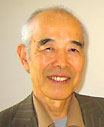Eden
The waters of the Tigris and the Euphrates
flowed from the spring in the middle of the Garden.
Beside it, the Tree of Life
and the Tree of Knowledge
were heavy with fruit.
That was the place where long ago
Adam and Eve enjoyed their days
of naked innocence.
All around there recently
the U.S.A. has strewn bombs.
Mother Teresa
God lives inside Mother Teresa.
Using her fingers,
He held an old man's head
covered in flies
and moistened the old man's lips with drops of water.
With sunken cheeks
and mouth half-open,
the hollow eyes of the old man
for a moment became peaceful like a lake
just under Mother's face.
Her face, once lustrous,
is covered with mountains of furrows.
Admiring them,
each peak
seems higher than the Himalayas.
I Didn't Know That
"I didn't know,"
the German who was being interviewed
answered. "I thought it was strange that
Jewish people disappeared from my neighborhood,
but I didn't know that they were massacred like that."
"I didn't know,"
another German
answered with a truthful face. "I totally didn't know
that our government captured Jewish people,
plundered them so, starved them so,
and then burned them to death."
"I didn't know,"
answered one more German
as he leaned forward. "I thought
that they migrated to other countries. I believed
that they lived there full of happiness.
I didn't know a thing about Auschwitz."
Did they really not know?
Wasn't it possible for them to know?
Were they so afraid of knowing that they didn't try to know?
If they knew and did nothing,
they would have been tortured by guilt,
so did they pretend that they knew nothing because they wanted to live happily?
Our country also did the same thing.
Almost nobody knew
the evils the Emperor's army perpetrated,
nor tried to know.
And it won't change
because this country of Japan has become more and more cunning
to hide its portion of the dark.
The President and the Prime Minister
In Germany, do Hitler and his henchmen
become gods?
And are they worshipped
in any church or shrine?
In Japan, everyone, even war criminals
can become a god or Buddha after they die.
So that's what became of Tojo and his henchmen,
and they are worshipped as such in Yasukuni Shrine.
In Germany, does the President go
to visit Hitler and his henchmen's graves?
In Japan, the Prime Minister goes to Yasukuni Shrine and worships
Tojo and his henchmen who have become gods, Buddha or both.
In Germany, does the Chancellor give thanksgiving to Hitler and his henchmen
for giving prosperity to the country?
In Japan, the Prime Minister gives thanksgiving to Tojo and his henchmen,
who became gods after their death,
for bringing prosperity to this country through their grace.
In Germany, does the President kneel down to pray to Hitler and his henchmen
for preserving the country's peace?
In Japan, the Prime Minister presents money, bows his head deeply,
and prays to Tojo and his henchmen for protecting this country's peace.
He (the Emperor)
He has been under a sentence of life imprisonment
from before He was born.
He can't escape from his position.
Even if He dies, He can't escape from there.
His descendants and his descendants' descendants also
can't escape from there.
If He shows the first sign
of trying to escape from there,
the guards of the establishment, in order to protect their status,
and keep their pockets flush,
pounce on him in alarm
and respectfully bind him hand and foot.
He wants to walk around towns freely,
He wants to wander in department stores.
He wants to go to a barbershop and have his ears cleaned,
He wants to get a rubdown,
He wants to go to a bar and drink
and be called "Little Emperor."
He wants a surname, wants the right to vote,
He wants to join the Japanese Communist Party.
He wants to be released from this prison
to cultivate a corner of land with a devoted woman
and live a life of love.
He wants to raise his children as others do.
—Once He was a living god, but distant ancestors
were powerful provincial clan members with faces
covered by needle-like black beards,
and attacked, stole, killed, raped, burned and overwhelmed adjacent clans,
but now his distant descendants have become symbols of the state
and prisoners under sentence of life imprisonment.
